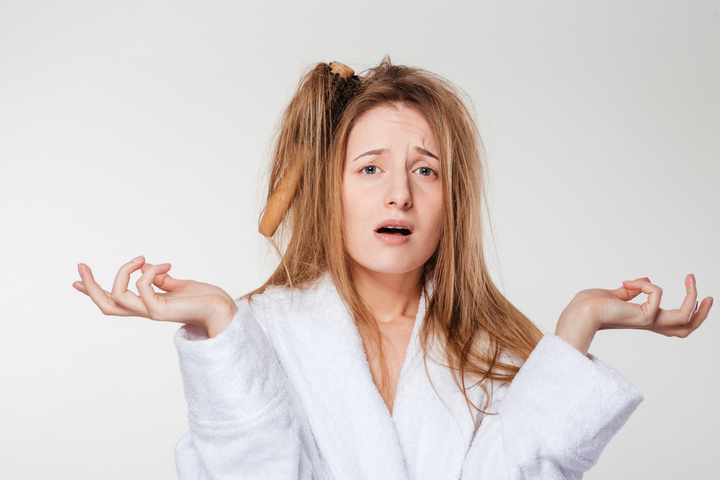What Is Normal When You Lose Hair?
We lose hair every day. Some more than others.
Then there are those days when after taking a shower you dry your hair with a towel and it looks like most of your hair is in the towel! That’s frightening but there can be a simple explanation.
It’s true that hair loss can be an early sign of some more serious diseases. However, when certain physical changes happen in your body it can interrupt your hair’s normal life cycle and cause you to have a significant loss all around the same time.
These changes are significant enough to cause hair loss but aren’t necessarily a signal of a major illness. Here’s a good explanation of your hair’s normal life cycle.
The times when I’ve pulled fistfuls of hair out of my head in the shower, my life wasn’t particularly stressful—or at least, it wasn’t until my hair started coming out. Then, of course, I assumed I was either balding or belatedly inheriting my family’s matrilineal thin hair. Faced with the stark reality of my hair-related vanity, I would try to comfort myself with the fact that I could at least wear fun wigs. You know, the natural cycle of things.
But the explanation for this actually lies in another cycle—the life cycle of a hair.
Basically, a hair grows, then stops growing, then falls out. (Revelatory, I know. But stay with me.) The growth phase, or anagen, of a human head hair can last two to six years, which is why our head hairs can get so long. Other hairs have much shorter growth phases—an eyelash’s, for example, is 30 days. After anagen, a hair goes into catagen, a very short phase lasting just a couple days, in which the follicle shrinks a little bit. That’s followed by telogen, when the hair pretty much just sits there, doing nothing. Then, at last, exogen, when it falls out.
This process is always happening, and it’s totally normal for a person to lose between 50 and 100 hairs a day this way. That’ll plug your drain up, but compared to the 90,000 to 150,000 total hairs on the average person’s head, it’s pennies.
– via The Atlantic
What Causes You To Lose Hair?
You may have heard that stress causes you to lose hair. That can be true but it depends on the type and level of stress.
Don’t let yourself spend any more time worried about why you are losing hair? The excerpt below will help you understand what is behind your hair loss.
What’s Stressing You
Paradi Mirmirani, MD, a dermatologist with the Permanente Medical Group in Vallejo, Calif., says it all depends on what type of stress you’re talking about.
“Stress because you’re late to work or you’ve got a heavy workload is not going to cause you to lose hair,” she says. Short-term, everyday stress is not going to affect your body in such a way that your hair falls out. It takes something larger to do that. “Something that causes you to lose sleep,” Mirmirani says, “or changes your appetite and raises the level of stress hormones.”
McMichael puts it more bluntly. “There has been, for my entire life, this mythical connection between stress and hair. It’s absolutely ridiculous.” McMichael says there is no evidence to support the idea that just because you had a few stressful days last week your hair will fall out this week. “It doesn’t even work that way,” she says.
Stress and Hair: The Hair Cycle
A normal head of hair contains about 120,000-150,000 strands of hair.
Usually, at any one time, about 90% of those hairs are in a growing phase, growing by about 1/2 inch each month. This phase lasts for two to three years.
At that point, a hair will go into a resting stage. This “rest” lasts for 3 to 4 months before the hair falls out and is replaced by a new one.
“Typically, people shed about 100 hairs a day,” says Carolyn Jacob, MD, founder and medical director of Chicago Cosmetic Surgery and Dermatology. “Most people don’t even notice.”
Sometimes, a significant stress of some sort may spark a change in your body’s routine physiological functions, Jacobs says, and cause a disproportionate number of hairs to go into the resting phase at the same time. Then three to four months later, sometimes longer, all those resting hairs are shed. The effect can be alarming. The types of events that disrupt the normal hair cycle, Jacob says, can be caused by the substantial physiological stresses on your body.
But, according to McMichael, physiological stress is not the same as emotional stress. Hair loss can be one way the body responds to significant physiological stress that may be brought on by diet, medical, or lifestyle changes.
“Only those things that cause physiological stress can cause a hair loss event,” McMichael says. The good news is that the hair loss from these kinds of events is usually temporary, as long as the stress event is temporary. Once the stressor is addressed or goes away on its own, hair grows back and the normal hair cycle resumes.
– via WebMD
Have you ever experienced a shedding type of hair loss?
